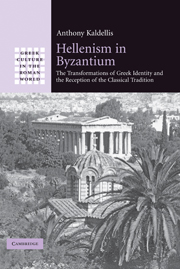 Hellenism in Byzantium
Hellenism in Byzantium General conclusions
Published online by Cambridge University Press: 24 December 2009
Summary
To the degree that Byzantium was simultaneously Roman, Christian, and Greek, it owed its existence to three traditions that originated at roughly the same time, namely in the sixth through the fourth centuries BC. That was when the Roman res publica, Jewish Scriptural monotheism, and Greek paideia all came into being. The history of their interactions in antiquity was a continuing development that pointed toward and ultimately culminated in Byzantium. Conversely, Byzantine historical awareness extended solidly back to that time of origins and beyond, to the heroic wars, migrations, and epiphanies of the second millennium BC. The Byzantines' imagined ancestors included Aeneas and the clans of the Republic, the Israelites of the Old Testament covenant, and Greek thinkers. Yet “descent” was conceived differently in each case and varied by circumstance and rhetorical effect: it could be biological, symbolic, political, or cultural.
A Byzantine could simultaneously be a Roman, a Christian, and a Greek, because those three identities defined different parts of his life. But to the degree that it was not understood as paganism, Hellenism was the least important of the three and the most rarefied. It also generated the fewest institutions. The land of Greece was always there, of course, but inspired neither enthusiasm nor loyalty. The Greek language was more important in terms of defining Byzantine identity and became an object of scrutiny especially in political and ecclesiastical debates with the Latin West. But no institutions were needed for its preservation and continuity.
Information
- Type
- Chapter
- Information
- Hellenism in ByzantiumThe Transformations of Greek Identity and the Reception of the Classical Tradition, pp. 389 - 397Publisher: Cambridge University PressPrint publication year: 2008